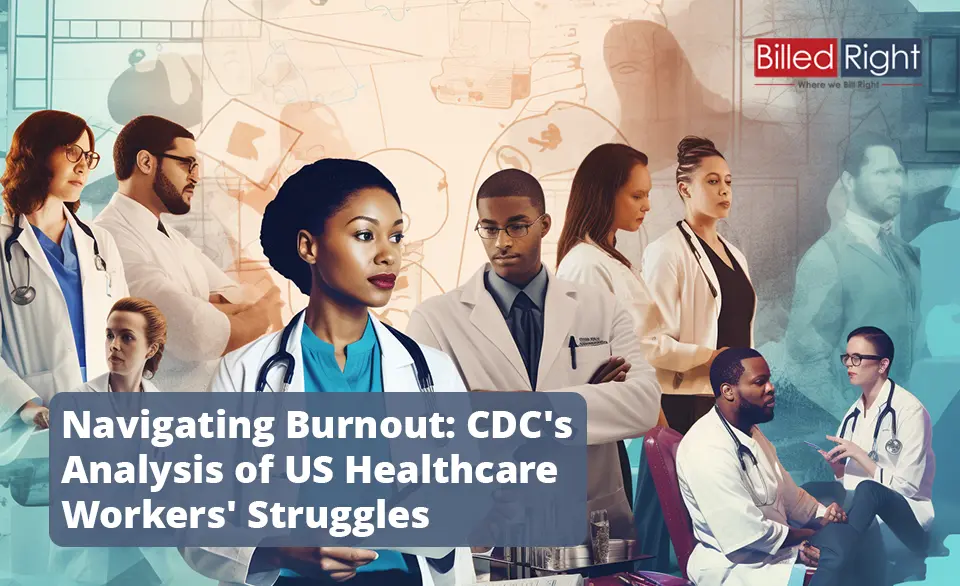Breaking Down the CDC Report: U.S. Health Workers and the Mental Health Crisis
A new CDC study aimed to investigate and analyze the mental health challenges faced by U.S. health workers, particularly during and after the COVID-19 pandemic. The study used data from the General Social Survey Quality of Worklife Module, comparing responses from 2018 to 2022 to understand the changes in self-reported mental health symptoms.
The significance of the CDC’s insights lies in uncovering the extent of the mental health crisis among health workers and identifying key factors influencing their well-being.
As the pandemic posed unique challenges, understanding the impact on mental health is crucial for developing strategies to support health workers effectively.
These insights provide valuable information for healthcare organizations, policymakers, and employers to implement measures that promote positive working conditions and address the mental health needs of this essential workforce.
The study serves as a call to action to improve health workers’ overall well-being and enhance the healthcare system’s resilience.
The Numbers Speak: Mental Health Challenges Among U.S. Health Workers
Key Findings (2018-2022):
- Poor Mental Health Days: Health workers reported a significant increase from 3.3 days (2018) to 4.5 days (2022).
- Burnout Rates: The percentage of health workers feeling burnout very often rose from 11.6% to 19.0% in 2022.
- Harassment Impact: Harassment at work is linked to increased odds of anxiety (OR = 5.01), depression (OR = 3.38), and burnout (OR = 5.83).
- Positive Trends: Trust in management, supervisor support, sufficient work time, and supportive workplace conditions are associated with lower burnout odds in 2022.
For a detailed exploration of these findings, refer to the CDC study for a comprehensive overview of the results.
Behind the Stats: Understanding the Factors Affecting Health Worker Well-being
Working conditions can significantly influence the well-being of health workers. The study revealed compelling insights into the associations between working conditions and mental health outcomes among U.S. health workers in 2022.
Trust in Management:
- New Insight: Trusting management emerged as a pivotal factor. Health workers who expressed trust reported a notable decrease in burnout, emphasizing the importance of a supportive leadership environment.
Supervisor Support:
- Unique Perspective: Supervisors played a crucial role. Those with supportive supervisors felt a sense of security and experienced significantly lower odds of burnout, highlighting the impact of managerial relationships.
Sufficient Work Time:
- Time Matters: The luxury of having enough time to complete work was a protective factor. Health workers with sufficient time reported lower odds of burnout, underlining the significance of realistic workload expectations.
Workplace Productivity Support:
- A Productive Environment: Feeling that the workplace supported productivity showcased a noteworthy link to reduced burnout odds. This suggests that fostering a work environment conducive to productivity positively impacts mental well-being.
Harassment Impact:
- Addressing Challenges: The study underscored the harsh reality of workplace harassment. Health workers facing harassment were at significantly higher risk of anxiety, depression, and burnout, emphasizing the urgent need to address workplace challenges.
Understanding these nuances offers a deeper appreciation for the intricacies of health workers’ experiences.
Facing Challenges: Harassment’s Link to Anxiety, Depression, and Burnout in Healthcare Settings
Heightened Anxiety (OR = 5.01):
- Significant Impact: Workplace harassment was strongly associated with a fivefold increase in the odds of anxiety among health workers. The hostile work environment created by harassment significantly contributes to heightened anxiety levels.
Increased Depression (OR = 3.38):
- Distressing Consequences: Health workers facing harassment reported 3.38 times higher odds of experiencing depression symptoms. The emotional toll of workplace mistreatment exacerbates mental health challenges, leading to a notable impact on well-being.
Elevated Burnout (OR = 5.83):
- Severe Consequences: Harassment at work was linked to a nearly sixfold increase in the odds of burnout. The persistent exposure to hostile actions or behaviors significantly contributes to feelings of emotional exhaustion, detachment, and low personal accomplishment.
Understanding the profound implications of workplace harassment on mental health underscores the urgent need for interventions and support mechanisms.
Moving Forward: Practical Steps for Health Workers and Employers
Enhance Trust and Communication:
- Tip: Foster open communication channels to build trust between management and health workers.
- Preventive Measure: Implement regular feedback sessions and transparent communication strategies to enhance trust in organizational leadership.
Invest in Supervisor Training:
- Tip: Provide training programs for supervisors to enhance their support skills.
- Preventive Measure: Equip supervisors with the tools to recognize signs of stress and provide meaningful support to their team members.
Optimize Workload Management:
- Tip: Assess and optimize workload expectations for health workers.
- Preventive Measure: Implement realistic workload assessments and ensure health workers have sufficient time to complete their tasks, reducing the risk of burnout.
Cultivate a Positive Work Environment:
- Tip: Promote a positive and inclusive workplace culture.
- Preventive Measure: Encourage initiatives that foster positivity, teamwork, and a supportive work environment, ultimately contributing to better mental health outcomes.
Implement Anti-Harassment Policies:
- Tip: Establish and communicate clear anti-harassment policies.
- Preventive Measure: Create a comprehensive policy framework that addresses and prevents workplace harassment, ensuring a safe and respectful environment for all health workers.
Thank you for exploring the crucial landscape of health worker well-being with us. If you crave more insightful updates and recommendations, dive deeper! Fill out the form now to stay in the loop and receive exclusive content tailored for professionals like you. Let’s prioritize health worker’s mental health together.


 Insurance Eligibility
Insurance Eligibility Charge Posting
Charge Posting Documentation Review
Documentation Review Claim Submission
Claim Submission Denial Management
Denial Management Payment Posting
Payment Posting Accounts Receivables Follow-up
Accounts Receivables Follow-up Patient Collections
Patient Collections Reporting
Reporting Account Management
Account Management